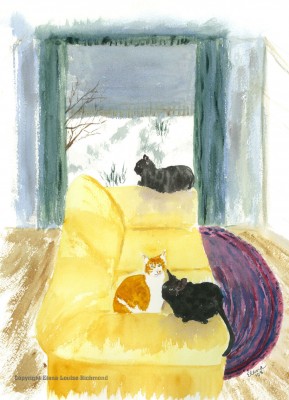Reminiscences of Cat Pus Past
This blog is not for the squeamish:
Recently Freud, the cat, got into some kind of altercation with his analysand across the alley. It may be time to terminate their professional relationship as it seems to have taken a new direction. (https://www.elenalouiserichmond.com/2010/09/the-post-freudian-cat/)
In any case, Freud came in with a bump the size of a filbert on his left cheek. By evening, the bump had become so enlarged it looked like he was growing a second head. I traced a streak of blood to its source: a pinhole of a puncture wound. I wrestled him down and treated the area with alcohol and Neosporin.
Freud leaped out of my hold, raced twice around the house, and ended up at his dish, demanding food. In other words, he wasn’t about to let two heads slow him or his appetite down.
I have been through so many puncture wound scares that even a two-headed cat makes me only slightly uneasy. How many times have I said: “OK, if it’s not any better by Friday (Saturday, Monday), I’ll take him to the vet”? How many times has the vet said, “It doesn’t look infected. Just keep it dry. That’ll be $60 ($80, $95)”?
By the next day, there was a bump the size of a chestnut but just the one head. For the next week the fur on the left side of Freud’s face was wet and matted and Winston was continually licking it. Finally the fur looked dry and normal, the bump was the size of a sunflower seed and Winston had to find some other interesting discharge to lick.
Freud’s prodigious drainage reminded me of a time Winston got an abscess on his forehead –also from a puncture wound. It appeared like the beginnings of a unicorn horn. When I pushed on it, something alive appeared to move inside the bump. I put a warm, damp towel on it for as long as Winston would let me. A great gush of foul-smelling pus poured out like an underground spring come unblocked. “Winston of the Spring.” It came in rolling waves. While I’d have liked to pass out from the stench, Artemis went for it like a gourmand. She licked it for days and kept it clean and dry.
Here’s another odor anecdote: I came home to find a storm of bird feathers settled all over the entrance to the front room. Now this is far more unpleasant than popping cat zits. I especially don’t like finding little bird feet and other spare parts among the feathers. But it’s even worse when I don’t find them at all which was the case on this occasion. All I found were feathers. A day passed. I looked everywhere. I vacuumed everywhere.
Just when I stopped thinking about it, I began to smell something funky. Tracing the odor to its source, I found under the wood stove, a festive pile of cat puke, festooned with bits of fur and grass. Perched on top, at a jaunty angle like a bizarro Martha Stewart project, sat a whole and complete bird head.
I decided this was Freud’s doing, judging by the pitiful look that had been on his face for the previous 24 hours. Otherwise I would have bet on Winston who will eat anything. When he was still a small kitten, Winston threw up an entire shoelace, complete with the aglets on the tips. (I won’t tell you how I discovered he loves the taste of human ear wax.)
I picked up the puke cupcake with gloves and two thicknesses of plastic bag without actually looking at it. This is also how I deal with dead rats if my neighbor isn’t home. (https://www.elenalouiserichmond.com/2010/08/rodent-incident-report-1/) (https://www.elenalouiserichmond.com/2010/08/rodent-incident-report-2/)
I would rather explode pockets of putrid cat pus any day than cope with rodents of any size, dead or alive. Now that’s love.
 RSS Feed
RSS Feed



